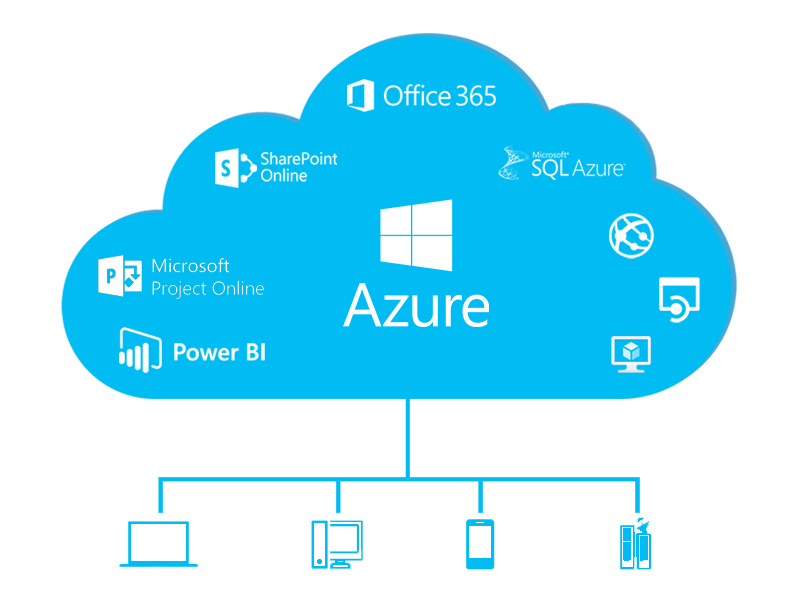Azure Services
Comprehensive set of cloud computing services for businesses
Microsoft Azure/Cloud
A comprehensive set of cloud computing services for businesses
Microsoft Azure is an ever-expanding set of cloud services to help your organization meet your business challenges. It is the freedom to build, manage and deploy applications on a massive, global network using your favorite tools and frameworks.
Managed Services
Administrating your Azure services.
• Azure Compute • Azure Containers • Azure DevOps • Azure Integration • Azure Migration • Azure Storage • Azure Database • Azure Analytics • Azure Networking • Azure Security • Azure Identity • Azure Web • Azure Mobile

Azure Services Offered
- STORAGE & BACKUP
Get highly secure storage and backup services on Azure including blob, file, and queue storage.
- APP HOSTING
Accelerate your app development by integrating App Service to your existing frameworks.
- DISASTER RECOVERY
Get excellent failover and redundancy on Azure with over 50 Azure regions all over the world.
- IDENTITY MANAGEMENT
Simplify your ID management process with Azure Active Directory (AD) by providing a single sign-on (SSO).
- INFRASTRUCTURE MANAGEMENT
Meet the growing needs of your business with highly available, secure, and scalable infrastructure on Azure cloud.
BENEFITS
High availability: Depending on the service-level agreement (SLA) that you choose, your cloud-based apps can provide a continuous user experience with no apparent downtime, even when things go wrong.
Scalability: Apps in the cloud can scale vertically and horizontally Scale vertically to increase compute capacity by adding RAM or CPUs to a virtual machine. Scaling horizontally increases compute capacity by adding instances of resources, such as adding VMs to the configuration.
Elasticity: You can configure cloud-based apps to take advantage of autoscaling, so your apps always have the resources they need.
Agility: Deploy and configure cloud-based resources quickly as your app requirements change.
Geo-distribution: You can deploy apps and data to regional data centers around the globe, thereby ensuring that your customers always have the best performance in their region.
Disaster Recovery: By taking advantage of cloud-based backup services, data replication, and geo-distribution, you can deploy your apps with the confidence that comes from knowing that your data is safe in the event of a disaster.
IaaS: Infrastructure-as-a-Service
This cloud service model is the closest to managing physical servers; a cloud provider will keep the hardware up-to-date, but operating system maintenance and network configuration are up to you as the cloud tenant. For example, Azure virtual machines are fully operational virtual compute devices running in Microsoft datacenters. An advantage of this cloud service model is the rapid deployment of new computing devices. Setting up a new virtual machine is considerably faster than procuring, installing, and configuring a physical server.
PaaS: Platform-as-a-Service
This cloud service model is a managed hosting environment. The cloud provider manages the virtual machines and networking resources, and the cloud tenant deploys their applications into the managed hosting environment. For example, Azure App Services provides a managed hosting environment where developers can upload their web applications, without having to worry about the physical hardware and software requirements.
SaaS: Software-as-a-Service
In this cloud service model, the cloud provider manages all aspects of the application environment, such as virtual machines, networking resources, data storage, and applications. The cloud tenant only needs to provide their data to the application managed by the cloud provider. For example, Microsoft Office 365 provides a fully working version of Microsoft Office that runs in the cloud. All you need to do is create your content, and Office 365 takes care of everything else.
SHIFTING CAPEX TO OPEX
The on-premises data center capacity by moving the SAP workload to Microsoft Azure without up-front investment. Since the Virtual Hard Disk (VHD) that contains the OS runs with the same name as that of the on-premises system, organizations can easily move Azure deployments back to the on-premises data center.
THE SCOPE OF OUR AZURE MANAGED SERVICES
Azure administration and troubleshooting
- Administrating your Azure services.
- Configuring your Azure resources.
- Managing data flows going through Azure.
- Backing up the data stored in your Azure resources.
- Addressing the issues resulting from application and server misconfigurations, server overloads, and investigating event logs to find the root causes of incidents and prevent them from reappearing.
Azure monitoring 24/7
We can properly configure such tools as Azure Monitor to ensure that your applications are highly available and reliable. We exert all efforts to avoid system downtime within your IT environment and provide you with detailed reports on your Azure resources’ utilization and performance.
Azure Usage Optimization
With your business objectives in mind, our IT team defines underutilized resources and develops a plan to increase the efficiency of your Azure resource utilization. We are ready to give actionable recommendations on the usage of your Azure service optimization.
Azure Cyber Security
We secure your Azure environment with:
- Designing the entire security strategy and its technical components.
- Configuring and managing access to cloud resources.
- Performing regular security monitoring across your Azure environment.
- Timely detecting breaches in your cloud IT infrastructure.
- Providing security patches and updates.
- Performing regular vulnerability scans and penetration testing.
Azure for SAP Workloads Specialty
Microsoft Azure enables customers to run SAP applications, databases, platforms, and workloads using the cloud. The SAP customers can quickly build, deploy, manage and scale SAP applications, enabling them to respond faster to changing business needs.
COST
We are flexible in pricing and offer the following pricing models:
Fixed monthly fee based on the IT infrastructure specifics. Good for the predictable service scope, which is discovered during the transition phase. We include the costs of one-time activities in the monthly support budget and gradually introduce all process changes to avoid large one-time expenses.
Pay-per-use where a monthly fee is a percentage of a cloud provider’s monthly bill. The percentage depends on the volume of cloud resources consumed.

